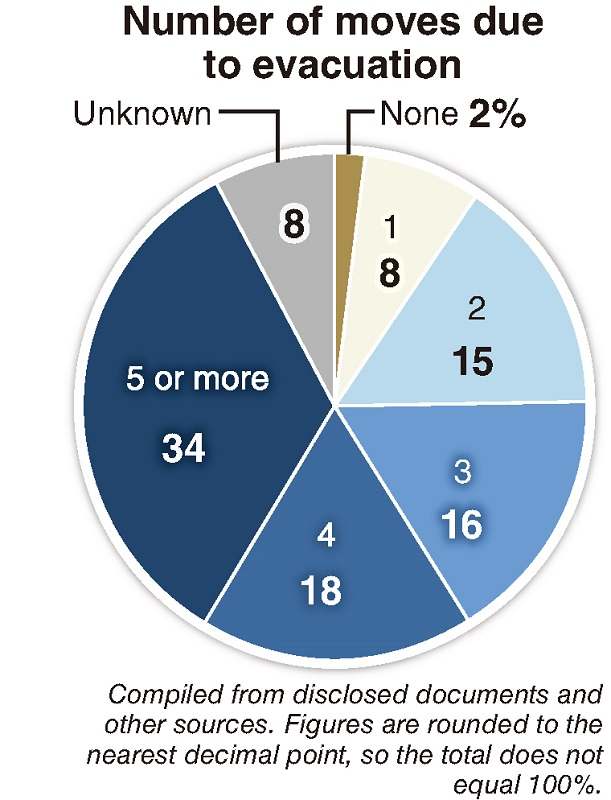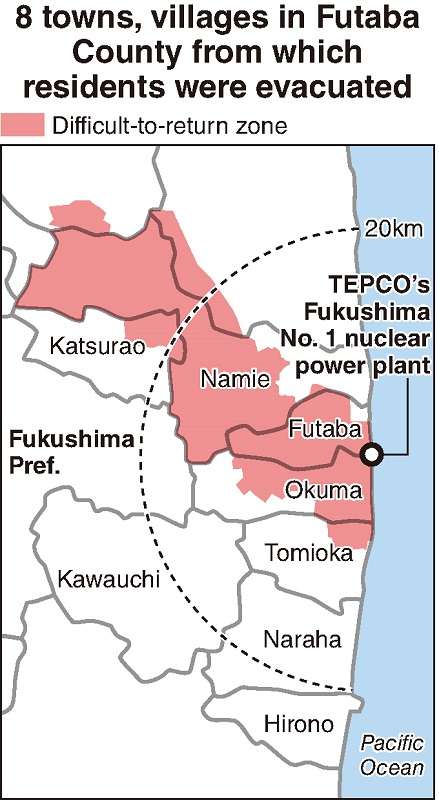Moving several times due to Fukushima nuclear accident common among disaster-related deaths

14:59 JST, March 9, 2021
Nearly 70% of the people from the county where the Fukushima No. 1 nuclear power plant is located whose deaths were certified as disaster-related had moved at least three times because of evacuation, according to a survey by The Yomiuri Shimbun.
The survey brings to light the fact that the victims’ physical condition deteriorated as they lived precariously in evacuation centers or relatives’ homes.
Disaster-related deaths are those not caused by direct means such as a building collapse or a flood, but by means such as a worsening of an illness or exhaustion due to evacuation. A panel of doctors and lawyers in each municipality certifies such deaths. If so certified, the bereaved family will receive a disaster condolence payment of up to ¥5 million.
In the aftermath of the 2011 Great East Japan Earthquake, 3,772 deaths of people from 10 prefectures were so certified, according to The Yomiuri Shimbun. Of these, 2,317 were from Fukushima Prefecture.
Of the 1,504 disaster-related deaths of people from the eight towns and villages of Futaba County, Fukushima Prefecture, where evacuation orders were issued in the wake of the accident at Tokyo Electric Power Company Holdings, Inc.’s nuclear plant, 1,017 people had moved three or more times due to evacuation.
After the nuclear accident in March 2011, evacuation orders were issued to 12 municipalities in Fukushima Prefecture. Almost all the residents of Futaba County were evacuated inside and outside of the prefecture. The number of disaster-related deaths among the people from the county was more than seven times higher than the 212 direct deaths such as those caused by the tsunami.
The Yomiuri Shimbun requested the local governments to disclose documents related to the certification of disaster-related deaths and analyzed the evacuation situation.

The percentage of people from Futaba County who suffered disaster-related deaths and had moved five or more times was 34%, while 18% moved four times, 16% three times and 15% twice. The highest number of times was 22.
Of the Futaba County disaster-related deaths, 25% of the victims did not return to their hometowns but died in evacuation centers outside the prefecture.
By age, more than 80% of the victims were over 70. Of these, 70% had chronic illnesses such as high blood pressure or diabetes. By cause of death, pneumonia and heart disease were the most common.
The towns of Okuma and Futaba disclosed the detailed causes of death, with multiple reasons possible per person, for a total of 283 disaster-related deaths: 58% died due to “stress and deterioration of physical condition” caused by evacuation, 57% due to “harshness of evacuation” such as repeated moves, and 2.4% due to suicide.
An analysis of the timing of the deaths of the 1,504 victims reveals a characteristic of evacuation from the nuclear power plant accident: prolonged evacuation.
According to the Reconstruction Agency, more than 90% of the deaths in Iwate and Miyagi prefectures occurred within one year of the disaster. In the eight towns and villages in Fukushima, 42% of the deaths occurred in 2011, the year the disaster occurred. As time passed, disaster-related deaths continued, with 9% of deaths occurring after 2016.
The percentage of deaths certified as disaster-related, however, has been decreasing year after year.
So far for Futaba County, 73% of the 2,052 deaths for which people sought such certification have been so designated. The percentage was 98% in 2012, but dropped to 51% in 2017 and 30% in 2020-21.
Recently, it has become more difficult to prove the causal relationship between illness and evacuation.
Top Articles in Society
-

Man Infected with Measles Reportedly Dined at Restaurant in Tokyo Station
-

Man Infected with Measles May Have Come in Contact with Many People in Tokyo, Went to Store, Restaurant Around When Symptoms Emerged
-

Woman with Measles Visited Hospital in Tokyo Multiple Times Before Being Diagnosed with Disease
-

Australian Woman Dies After Mishap on Ski Lift in Nagano Prefecture
-

Foreign Snowboarder in Serious Condition After Hanging in Midair from Chairlift in Nagano Prefecture
JN ACCESS RANKING
-

Japan PM Takaichi’s Cabinet Resigns en Masse
-

Japan Institute to Use Domestic Commercial Optical Lattice Clock to Set Japan Standard Time
-

Israeli Ambassador to Japan Speaks about Japan’s Role in the Reconstruction of Gaza
-

Man Infected with Measles Reportedly Dined at Restaurant in Tokyo Station
-

Videos Plagiarized, Reposted with False Subtitles Claiming ‘Ryukyu Belongs to China’; Anti-China False Information Also Posted in Japan





















